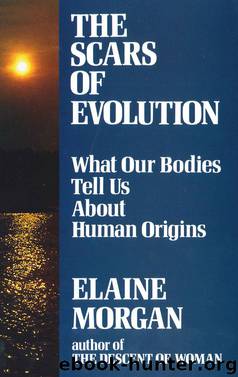The Scars of Evolution by Elaine Morgan

Author:Elaine Morgan [Elaine Morgan]
Language: eng
Format: epub
ISBN: 9780285641327
Publisher: Souvenir Press
Published: 2012-11-23T05:00:00+00:00
The problem was solved by adding salt to the workers’ food or drinking water. Much more recently a similar ‘miracle cure’ was found which saved millions of lives in the Third World: oral rehydration.
It is an extraordinary fact that what The Lancet described as ‘… probably the most important medical break-through of the century’ was one of the simplest and cheapest. By this time it has saved millions of lives in the Third World. As the UNICEF report pointed out in 1984: ‘These children do not die from exotic causes requiring sophisticated cures. Five million of them die annually in a stupor of dehydration caused by simple diarrhoea.’ Salt eliminated in the faeces left their bodies short of sodium. Oral rehydration therapy – a simple cheap solution of sugar and salt – instantly halved the diarrhoea death rate in the villages where it was administered. No other animal needs a professor or a travelling nurse to make it aware that it is suffering from a salt deficiency, or to issue advice on what to do about it.
At the other extreme, people in the First World are liable to consume up to fifteen times as much salt as they need, and the same ‘failure on the part of the nervous system’ leaves them unaware that they are overdoing it. Many doctors have told us that statistics from many countries seem to suggest that a high intake of salt correlates with a high incidence of hypertension. There are tribes living in low-salt areas where blood pressure actually goes down in old age. Among white races, high salt intake has been identified as a factor in hypertension for some people, though not for everyone. But the ill-effects of over-consumption of salt are less dramatic and immediate than the results of deficiency, so their warnings to date have made little impact on our eating habits.
An ape living on sea food would have been comparatively well placed to adjust to a saline environment. As a primate it possessed eccrine glands in greater numbers than non-primate species, and they were already structured to exude salt water. All that was needed was an increase in the output of the glands and a further increase in their number. The instinct for responding to ‘salt hunger’ could well have been lost at this stage. Sodium deficiency would not have been a danger that needed guarding against.
As the land-locked sea continued to shrink and become saltier, the aquatic apes would have been driven to retreat south along the water courses of the Rift Valley. By the time they were ready to return to terrestrial life, apocrine sweating was no longer an option for them: they had lost their apocrine glands. The eccrines were drafted to fill the gap, needing only two modifications. They have been adapted to respond to heat instead of salinity and to keep the leakage of sodium within more acceptable limits.
Download
This site does not store any files on its server. We only index and link to content provided by other sites. Please contact the content providers to delete copyright contents if any and email us, we'll remove relevant links or contents immediately.
Sapiens: A Brief History of Humankind by Yuval Noah Harari(14390)
Sapiens by Yuval Noah Harari(5372)
Pale Blue Dot by Carl Sagan(5010)
Homo Deus: A Brief History of Tomorrow by Yuval Noah Harari(4919)
Livewired by David Eagleman(3775)
Origin Story: A Big History of Everything by David Christian(3692)
Brief Answers to the Big Questions by Stephen Hawking(3436)
Inferior by Angela Saini(3316)
Origin Story by David Christian(3202)
Signature in the Cell: DNA and the Evidence for Intelligent Design by Stephen C. Meyer(3139)
The Gene: An Intimate History by Siddhartha Mukherjee(3099)
The Evolution of Beauty by Richard O. Prum(3000)
Aliens by Jim Al-Khalili(2830)
How The Mind Works by Steven Pinker(2816)
A Short History of Nearly Everything by Bryson Bill(2699)
Sex at Dawn: The Prehistoric Origins of Modern Sexuality by Ryan Christopher(2530)
From Bacteria to Bach and Back by Daniel C. Dennett(2485)
Endless Forms Most Beautiful by Sean B. Carroll(2483)
Who We Are and How We Got Here by David Reich(2437)
